|
|
|
Sort Order |
|
|
|
Items / Page
|
|
|
|
|
|
|
| Srl | Item |
| 1 |
ID:
178996
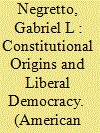

|
|
|
|
|
| Summary/Abstract |
A strong tradition in democratic theory claims that only constitutions made with direct popular involvement can establish or deepen democracy. Against this view, we argue that new constitutions are likely to enhance liberal democracy when they emerge through a plural agreement among political elites with distinct bases of social support. Power dispersion during constitution writing induces the adoption of institutions that protect opposition forces from the arbitrary use of executive power without unduly impairing majority rule. However, since incumbents may renege on the bargain, the democratizing effect of politically plural constitutional agreements is likely to be larger in the short term, when the identity of negotiating political forces and the balance of power between them tend to remain stable. We find support for these arguments using an original global dataset on the origins of constitutions between 1900 and 2015 and a difference-in-differences design.
|
|
|
|
|
|
|
|
|
|
|
|
|
|
|
|
| 2 |
ID:
179001


|
|
|
|
|
| Summary/Abstract |
Scholarship on separation of powers assumes executives are constrained by legislative approval when placing agents in top policy-making positions. But presidents frequently fill vacancies in agency leadership with unconfirmed, temporary officials or leave them empty entirely. I develop a novel dataset of vacancies across 15 executive departments from 1977 to 2016 and reevaluate the conventional perspective that appointment power operates only through formal channels. I argue that presidents’ nomination strategies include leaving positions empty and making interim appointments, and this choice reflects presidents’ priorities and the character of vacant positions. The evidence indicates that interim appointees are more likely when positions have a substantial capacity to act on presidential expansion priorities and suggest that presidents can capitalize on their first-mover advantage to evade Senate confirmation. The results further suggest that separation of powers models may need to consider how deliberate inaction and sidestepping of formal powers influence political control and policy-making strategies.
|
|
|
|
|
|
|
|
|
|
|
|
|
|
|
|
| 3 |
ID:
179003
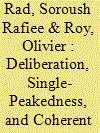

|
|
|
|
|
| Summary/Abstract |
Rational deliberation helps to avoid cyclic or intransitive group preferences by fostering meta-agreements, which in turn ensures single-peaked profiles. This is the received view, but this paper argues that it should be qualified. On one hand we provide evidence from computational simulations that rational deliberation tends to increase proximity to so-called single-plateaued preferences. This evidence is important to the extent that, as we argue, the idea that rational deliberation fosters the creation of meta-agreement and, in turn, single-peaked profiles does not carry over to single-plateaued ones, and the latter but not the former makes coherent aggregation possible when the participants are allowed to express indifference between options. On the other hand, however, our computational results show, against the received view, that when the participants are strongly biased towards their own opinions, rational deliberation tends to create irrational group preferences, instead of eliminating them. These results are independent of whether the participants reach meta-agreements in the process, and as such they highlight the importance of rational preference change and biases towards one’s own opinion in understanding the effects of rational deliberation.
|
|
|
|
|
|
|
|
|
|
|
|
|
|
|
|
| 4 |
ID:
179004
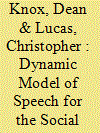

|
|
|
|
|
| Summary/Abstract |
Speech and dialogue are the heart of politics: nearly every political institution in the world involves verbal communication. Yet vast literatures on political communication focus almost exclusively on what words were spoken, entirely ignoring how they were delivered—auditory cues that convey emotion, signal positions, and establish reputation. We develop a model that opens this information to principled statistical inquiry: the model of audio and speech structure (MASS). Our approach models political speech as a stochastic process shaped by fixed and time-varying covariates, including the history of the conversation itself. In an application to Supreme Court oral arguments, we demonstrate how vocal tone signals crucial information—skepticism of legal arguments—that is indecipherable to text models. Results show that justices do not use questioning to strategically manipulate their peers but rather engage sincerely with the presented arguments. Our easy-to-use R package, communication, implements the model and many more tools for audio analysis.
|
|
|
|
|
|
|
|
|
|
|
|
|
|
|
|
| 5 |
ID:
178997


|
|
|
|
|
| Summary/Abstract |
Two mechanisms of costly signaling are known in international relations: sinking costs and tying hands. I show that there exist four mechanisms of costly signaling that are equally general. I develop the new mechanisms of installment costs and reducible costs and contrast them with sunk costs and tied-hands costs. I then conduct experiments to test the four signaling mechanisms. I find that each mechanism can improve credibility when the costs are high, but reducible costs can improve credibility even when the costs are low.
|
|
|
|
|
|
|
|
|
|
|
|
|
|
|
|
| 6 |
ID:
178987


|
|
|
|
|
| Summary/Abstract |
How does the symbolic power of a female president affect female parliamentary behavior? Whereas female descriptive representation has increased around the world, women parliamentarians still face significant discrimination and stereotyping, inhibiting their ability to have a real voice and offer “thick” representation to women voters. We leverage the case of Malawi, a case where the presidency changed hands from a man to a woman through a truly exogenous shock, to study the effect of a female president on female parliamentary behavior. Drawing on unique parliamentary transcripts data, we argue and show that women MPs under a female president become empowered and less confined to stereotypical gendered issue-ownership patterns, leading to a significant increase in female MP speech making. Our results directly address theories of symbolic representation by focusing particularly on intraelite role-model effects.
|
|
|
|
|
|
|
|
|
|
|
|
|
|
|
|
| 7 |
ID:
178998


|
|
|
|
|
| Summary/Abstract |
Globalization and automation have contributed to deindustrialization and the loss of millions of manufacturing jobs, yielding important electoral implications across advanced democracies. Coupling insights from economic voting and social identity theory, we consider how different groups in society may construe manufacturing job losses in contrasting ways. We argue that deindustrialization threatens dominant group status, leading some white voters in affected localities to favor candidates they believe will address economic distress and defend racial hierarchy. Examining three US presidential elections, we find white voters were more likely to vote for Republican challengers where manufacturing layoffs were high, whereas Black voters in hard-hit localities were more likely to vote for Democrats. In survey data, white respondents, in contrast to people of color, associated local manufacturing job losses with obstacles to individual upward mobility and with broader American economic decline. Group-based identities help explain divergent political reactions to common economic shocks.
|
|
|
|
|
|
|
|
|
|
|
|
|
|
|
|
| 8 |
ID:
178989


|
|
|
|
|
| Summary/Abstract |
In more than half of the democratic countries in the world, candidates face legal constraints on how much money they can spend on their electoral campaigns, yet we know little about the consequences of these restrictions. I study how spending limits affect UK House of Commons elections. I contribute new data on the more than 70,000 candidates who ran for a parliamentary seat from 1885 to 2019, and I document how much money each candidate spent, how they allocated their resources across different spending categories, and the spending limit they faced. To identify the effect on elections, I exploit variation in spending caps induced by reforms of the spending-limit formula that affected some but not all constituencies. The results indicate that when the level of permitted spending is increased, the cost of electoral campaigns increases, which is primarily driven by expenses related to advertisement and mainly to the disadvantage of Labour candidates; the pool of candidates shrinks and elections become less competitive; and the financial and electoral advantages enjoyed by incumbents are amplified.
|
|
|
|
|
|
|
|
|
|
|
|
|
|
|
|
| 9 |
ID:
179002


|
|
|
|
|
| Summary/Abstract |
Leo Strauss, in Philosophy and Law (1935), offers Platonic theocracy as a more just and stable political alternative to both liberalism and authoritarianism. Rather than merely a scholastic investigation of medieval Jewish and Islamic philosophy, I read the book as a programmatic endorsement of a morally perfectionist political order: a divinely legitimated and rationally justified “true” or “beautiful” state. Since human beings require political community to suppress their evil inclinations and promote their disposition toward the good, Strauss criticizes liberalism for contending that government should remain neutral regarding good and evil and modern authoritarianism for effectively committing idolatry by politically instrumentalizing theology. I demonstrate that Strauss’s long-neglected book is particularly relevant for our own “postsecular age,” an age when adherents of religious orthodoxy increasingly demand concessions from liberal democracies and resurgent state authoritarianism frequently cloaks itself in religious trappings.
|
|
|
|
|
|
|
|
|
|
|
|
|
|
|
|
| 10 |
ID:
179005
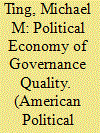

|
|
|
|
|
| Summary/Abstract |
This paper develops a dynamic theory of the social and political foundations of governance quality. In the model, groups of citizens have different expected needs for a public service, and citizens choose whether to demand service when the need arises. Politicians representing these groups can determine policy benefits and delegate to bureaucrats the ability to invest in long-run service quality. The main feature of the theory is its foundation for citizen–government interactions, which draws from well-known queueing models of organizational service provision. The model provides a framework for characterizing the effectiveness and durability of government programs. A main implication is that politicized bureaucracies improve program survivability and increase the frequency of investment, while insulated bureaucracies increase the intensity of investment; overall service quality trades off between these two factors. Other results examine the implications of cross-group inequality, electoral conditions, and decentralization.
|
|
|
|
|
|
|
|
|
|
|
|
|
|
|
|
| 11 |
ID:
178993


|
|
|
|
|
| Summary/Abstract |
How do mass publics react to lesbian, gay, bisexual, and transgender (LGBT+) advocacy efforts in socially conservative societies? We consider how the first-ever LGBT+ Pride in Sarajevo, Bosnia and Herzegovina influences ordinary citizens’ attitudes and behavior regarding LGBT+ support. Using nationwide and local panel surveys, we find that support for LGBT+ activism increased locally after the Pride but did not diffuse nationwide, signaling how proximity mechanisms reinforce Pride effects. In survey experiments, we show that subjects are responsive to both mobilization and counter-mobilization appeals by local activists. We also find evidence from a behavioral experiment that the Pride had a positive effect on shifting the allocation of financial resources toward local pro-LGBT+ activists and away from opposition groups. Finally, in-depth interviews with local LGBT+ activists underscore the challenges facing LGBT+ activism in socially conservative societies but also point to the substantial possibilities of collective action on behalf of minorities at risk.
|
|
|
|
|
|
|
|
|
|
|
|
|
|
|
|
| 12 |
ID:
178999
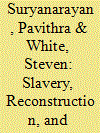

|
|
|
|
|
| Summary/Abstract |
Conventional political economy models predict taxation will increase after franchise expansion to low-income voters. Yet, contrary to expectations, in ranked societies—where social status is a cleavage—elites can instead build cross-class coalitions to undertake a strategy of bureaucratic weakening to limit future redistributive taxation. We study a case where status hierarchies were particularly extreme: the post-Civil War American South. During Reconstruction, under federal oversight, per capita taxation was higher in counties where slavery had been more extensive before the war, as predicted by standard theoretical models. After Reconstruction ended, however, taxes fell and bureaucratic capacity was weaker where slavery had been widespread. Moreover, higher intrawhite economic inequality was associated with lower taxes and weaker capacity after Reconstruction in formerly high-slavery counties. These findings on the interaction between intrawhite economic inequality and pre-War slavery suggest that elites built cross-class coalitions against taxation where whites sought to protect their racial status.
|
|
|
|
|
|
|
|
|
|
|
|
|
|
|
|
| 13 |
ID:
178988


|
|
|
|
|
| Summary/Abstract |
Women’s underrepresentation in American politics is often attributed to relatively low levels of political ambition. Yet scholarship still grapples with a major leak in the pipeline to power: that many qualified and politically ambitious women decide against candidacy. Focusing on women with political ambition, we theorize that at the final stage of candidate emergence, household income, breadwinning responsibilities, and household composition are interlocking obstacles to women’s candidacies. We examine these dynamics through a multimethod design that includes an original survey of women most likely to run for office: alumnae of the largest Democratic campaign training organization in the United States. Although we do not find income effects, we provide evidence that breadwinning—responsibility for a majority of household income—negatively affects women’s ambition, especially for mothers. These findings have important implications for understanding how the political economy of the household affects candidate emergence and descriptive representation in the United States.
|
|
|
|
|
|
|
|
|
|
|
|
|
|
|
|
| 14 |
ID:
178995


|
|
|
|
|
| Summary/Abstract |
Since Converse (1964) first proposed his “nonattitudes hypothesis,” numerous studies have confirmed that the public at large lacks ideologically consistent political attitudes. I put forth an event-based theory of attitude crystallization that explains how elections can strengthen attitude consistency and apply it to an issue domain integral to the left-right (liberal-conservative) cleavage: welfare politics. Specifically, I theorize that elections that give ideological opponents a majority will mobilize ideological predispositions, leading to more coherent welfare attitudes. I test the argument by relying on 11 Danish surveys linked to official records on local elections over four decades and using a regression discontinuity design. Evidence strongly supports the notion that elections increase attitude consistency if the majority produced goes against the individual’s ideological preferences. The findings stress the dynamic nature of attitude structure and the important role regular political events play in that regard.
|
|
|
|
|
|
|
|
|
|
|
|
|
|
|
|
| 15 |
ID:
178990


|
|
|
|
|
| Summary/Abstract |
This essay reconstructs an important but forgotten dream of twentieth-century political thought: universal suffrage as decolonization. The dream emerged from efforts by Black Atlantic radicals to conscript universal suffrage into wider movements for racial self-expression and cultural revolution. Its proponents believed a mass franchise could enunciate the voice of colonial peoples inside imperial institutions and transform the global order. Recuperating this insurrectionary conception of the ballot reveals how radicals plotted universal suffrage and decolonization as a single historical process. It also places decolonization’s fate in a surprising light: it may have been the century’s greatest act of disenfranchisement. As dependent territories became nation-states, they lost their voice in metropolitan assemblies whose affairs affected them long after independence.
|
|
|
|
|
|
|
|
|
|
|
|
|
|
|
|
| 16 |
ID:
178992


|
|
|
|
|
| Summary/Abstract |
Previous studies have documented ethnic/racial bias in politicians’ constituency service, but less is known about the circumstances under which such ethnocentric responsiveness is curbed. We propose and test two hypotheses in this regard: the electoral incentives hypothesis, predicting that incentives for (re)election crowd out politicians’ potential biases, and the candidate selection hypothesis, stipulating that minority constituents can identify responsive legislators by using candidates’ partisan affiliation and stated policy preferences as heuristics. We test these hypotheses through a field experiment on the responsiveness of incumbent local politicians in Denmark (N = 2,395), varying ethnicity, gender, and intention to vote for the candidate in the upcoming election, merged with data on their electoral performance and their stated policy preferences from a voting advice application. We observe marked ethnocentric responsiveness and find no indication that electoral incentives mitigate this behavior. However, minority voters can use parties’ and individual candidates’ stances on immigration to identify responsive politicians.
|
|
|
|
|
|
|
|
|
|
|
|
|
|
|
|
| 17 |
ID:
179000


|
|
|
|
|
| Summary/Abstract |
Partisans hold unfavorable views of media they associate with the other party. They also avoid out-party news sources. We link these developments and argue that partisans assess out-party media based on negative and inaccurate stereotypes. This means cross-cutting exposure that challenges these misperceptions can improve assessments of out-party media. To support this argument, we use survey-linked web browsing data to show that the public has hostile views of out-party news sources they rarely encounter. We conduct three survey experiments that demonstrate cross-cutting exposure to nonpolitical or neutral political stories, forms of news widely available from online partisan sources, reduces oppositional media hostility. This explains how perceptions of rampant bias from out-party media coexist with more modest differences in the online content of major partisan news outlets. More broadly, we illustrate how negative misperceptions can sustain animus towards an out-group when people avoid encounters with them.
|
|
|
|
|
|
|
|
|
|
|
|
|
|
|
|
| 18 |
ID:
178994


|
|
|
|
|
| Summary/Abstract |
The effects of austerity in response to financial crises are widely contested and assumed to cause significant electoral backlash. Nonetheless, governments routinely adopt austerity when confronting economic downturns and swelling deficits. We explore this puzzle by distinguishing public acceptance of austerity as a general approach and support for specific austerity packages. Using original survey data from five European countries, we show that austerity is in fact the preferred response among most voters. We develop potential explanations for this surprising preference and demonstrate the empirical limitations of accounts centered on economic interests or an intuitive framing advantage. Instead, we show that the preference for austerity is highly sensitive to its political backers and precise composition of spending cuts and tax hikes. Using a novel approach to estimate support for historical austerity programs, we contend that governments’ strategic crafting of policy packages is a key factor underlying the support for austerity.
|
|
|
|
|
|
|
|
|
|
|
|
|
|
|
|
| 19 |
ID:
178991
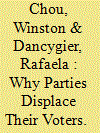

|
|
|
|
|
| Summary/Abstract |
Across advanced economies, affordable housing shortages are pushing low-income voters out of cities. Left governments frequently exacerbate these shortages by eliminating public housing. Why does the Left pursue policies that displace its voters? We argue that the Left’s long-term rebalancing towards the middle class and away from an increasingly stigmatized “underclass” has significantly attenuated the trade-offs inherent in reducing affordable housing. Focusing on the UK, we demonstrate that by alienating low-income voters politically and reshuffling them across districts, housing crises have significant costs for Labour. Yet, drawing on interviews, we show that displacement is nonetheless compatible with electoral interests: the displaced make room for richer voters whom politicians believe will also support Labour. A quantitative analysis of Greater London’s 32 local authorities and 624 wards further documents trends in line with coalitional rebalancing. Taken together, our findings demonstrate that electoral foundations are key to understanding housing crises and gentrification.
|
|
|
|
|
|
|
|
|
|
|
|
|
|
|
|
| 20 |
ID:
178986


|
|
|
|
|
| Summary/Abstract |
Canons of intellectual “greats” anchor the history and scope of academic disciplines. Within international relations (IR), such a canon emerged in the mid-twentieth century and is almost entirely male. Why are women thinkers absent from IR’s canon? We show that it is not due to a lack of international thought, or that this thought fell outside established IR theories. Rather it is due to the gendered and racialized selection and reception of work that is deemed to be canonical. In contrast, we show what can be gained by reclaiming women’s international thought through analyses of three intellectuals whose work was authoritative and influential in its own time or today. Our findings question several of the basic premises underpinning IR’s existing canon and suggest the need for a new research agenda on women international thinkers as part of a fundamental rethinking of the history and scope of the discipline.
|
|
|
|
|
|
|
|
|
|
|
|
|
|
|
|
|
|
|
|
|